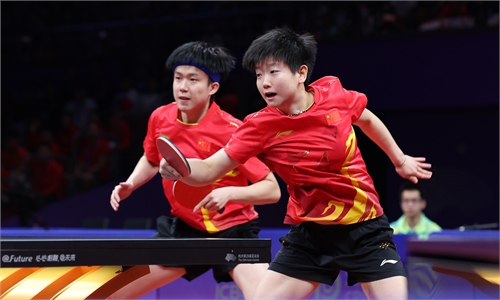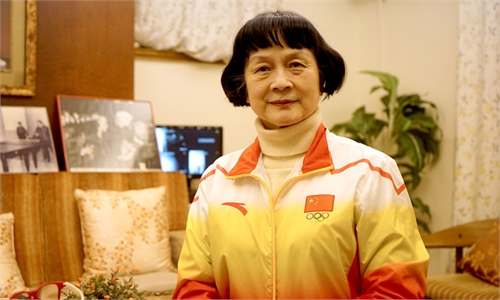IN-DEPTH / IN-DEPTH
Beyond the Arena: From grassroots fitness parks to international competition venues, shared athletic pursuits strengthen ties between China and Africa
Editor's Note:
Friendly exchanges between China and Africa have enjoyed a long history and have deepened in recent years, covering various fields such as politics, the economy, and culture. The Global Times is launching a China-Africa Rhapsody series, aiming to showcase the profound human connections and development visions between the two peoples by sharing the true stories of Chinese people in Africa and African people in China. From touching stories of China-Africa cooperation and exciting collisions of youthful ideas, to debunking fallacies concocted by some Western sources about the China-Africa collaboration, this series hopes to promote closer cooperation and deeper understanding between the peoples of China and Africa.
In this installment, we turn our attention to the world of sporting arenas. The Paris 2024 Olympics successfully concluded on Sunday night, local time, with athletes from China and Africa showcasing their remarkable talents. Sports cooperation between China and Africa began in the 1950s, and in recent years, significant achievements have been made in this field, making sports exchanges an important bridge for cultural exchange and mutual understanding between the Chinese and African peoples.
We spoke with coaches, experts, and enterprises directly involved in China-Africa sports exchanges to hear about their rich and diverse experiences and insights from working in Africa.
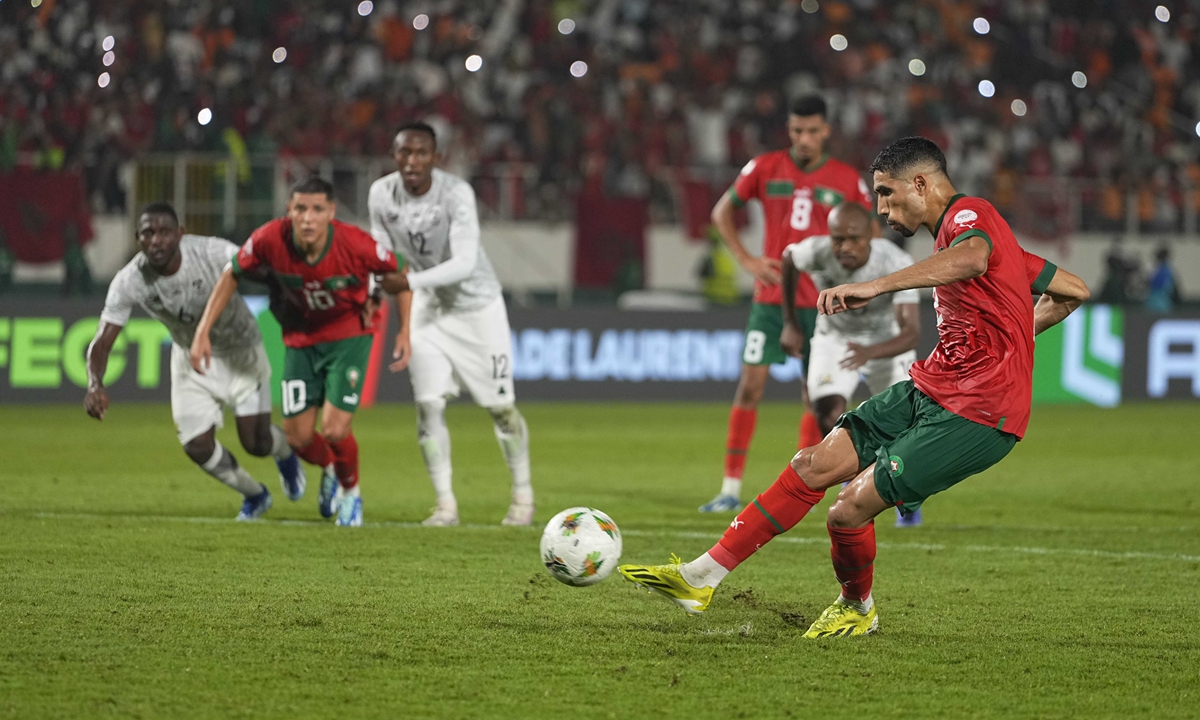
Sports exchanges between China and Africa began in the 1950s. In 1957, less than a year after China and Egypt established diplomatic relations, the Chinese table tennis team visited Egypt, marking the first Chinese sports delegation to set foot in Africa.
Since then, sports have played a vital role in bridging the two regions. The Chinese basketball and soccer teams have visited multiple African countries, while African teams like the Guinean and Moroccan national soccer teams have visited China.
These exchanges have deepened mutual understanding and trust, significantly contributing to the development of China-Africa relations.
In recent years, China has sent coaches for sports like badminton and table tennis to countries like Uruguay and has built or upgraded sports facilities in nations such as Guinea-Bissau. Additionally, China has provided technical training for large cultural and sporting events.
The 2021 White Paper "China and Africa in the New Era: A Partnership of Equals" released by the State Council highlighted that China has built 45 stadiums and 170 schools across Africa since 2000, training over 160,000 professionals, demonstrating the tangible benefits of the China-Africa partnership.
This growing "sports diplomacy" underscores the importance of cultural exchange and cooperation, enhancing the friendship between China and Africa.
The new home stadium
Wang Neng's initial impressions of Africa, aside from the scorching weather in West Africa, included the people's passion for soccer.
"Adults and children alike show off their soccer skills wherever they go," said Wang, 34, a project manager with the China Civil Engineering Construction Corporation (CCECC) based in Cote d'Ivoire.
Wang first arrived in Africa in 2015. He told the Global Times that most of the fields here were simply patches of wild grass, slightly modified for use as main venues for Cote d'Ivoire's soccer league. Ordinary people and children played casually on hard, unpaved fields.
Wang has made friends with locals by playing soccer, but he and his colleagues have done much more than that.
In January 2024, the 34th Africa Cup of Nations kicked off in Cote d'Ivoire, with the Laurent Pokou Stadium in San-Pedro, built by the CCECC, drawing significant attention.
The Laurent Pokou Stadium, with a seating capacity of over 20,000 and more than 2,000 parking spaces, saw local cultural elements incorporated into its construction. The venue boasts a world-class field, athletic track, and lighting. The CCECC also installed solar photovoltaic technology to support the country's sustainability efforts.
Now, with the CCECC having completed the construction of the main stadium and four training grounds in San Pedro, the local demand for sports facilities has been greatly met. The stadium's construction has also spurred the development of surrounding infrastructure, including hospitals, hotels, universities, airports, and municipal roads, significantly enhancing the city's image, the Global Times has learned from the CCECC.
Moreover, at least three stadiums built by Chinese companies were used in the Africa Cup of Nations held in Cote d'Ivoire earlier this year.
Despite some biased criticisms and attempts by Western media to sow discord in China-Africa relations, China's aid to Africa has consistently demonstrated a genuine understanding of the continent's needs and has withstood various tests.
Even The New York Times acknowledged in a February article that "no country has invested more effort in integrating into Africa's sports scene than China."
Perhaps they do not need not worry on behalf of Africans.
Team Cote d'Ivoire chose Laurent Pokou Stadium for their first two warm-up matches as the host country. Their star player, Sébastien Haller, praised the stadium, "For me, [it is] the best turf is at San-Pedro."
On February 13, 2024, Haller scored the winning goal in the final, helping Cote d'Ivoire defeat Nigeria to claim the championship of the 34th Africa Cup of Nations.
Coach for better
In the China-dominated table tennis field, there are also more African players who, with China's assistance and support, travel tens of thousands of miles to receive training in China along with their Chinese peers.
In late July, Nasri Malissa from Algeria made a speech at the 7th China-Africa People's Forum, sharing her story of receiving table tennis training in China. In 2016, Malissa attended the International Table Tennis Federation (ITTF) World Youth Championships held by the China Table Tennis College (CTTC) at the Shanghai University of Sport.
Malissa got the precious opportunity of being coached by renowned world champions including Zhang Yining during the championships. After that, Malissa said she made many excellent achievements in international competitions.
Malissa's experience has planted a seed in the hearts of more table tennis players in her home country, who dream of a similar journey to China. At an opening ceremony of the CTTC's summer school on July 1, 20-year-old Amdjed Oustani shared his excitement.
Oustani first heard of the CTTC from Malissa, who told him about the college's high-level coaches, first-class equipment, and an opportunity to meet the stars of the Chinese national table tennis team. "So, I was very happy and excited when I received the invitation from the CTTC," he said at the opening ceremony. "I'm super looking forward to learning more in the following month, and to become stronger in the world's number one table tennis country."
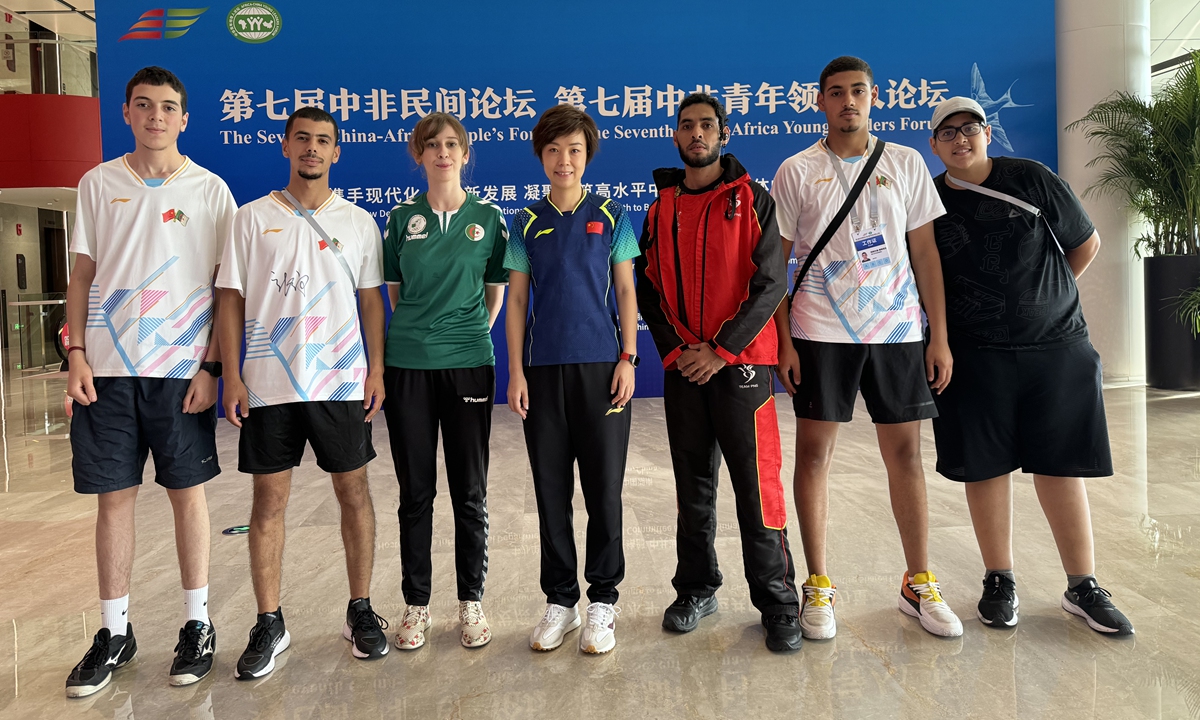
The month-long summer school program in Shanghai was not easy for most international participants. Oustani, who finished the program and returned to Algeria last week, recalled that he had a few difficult times in the beginning, as he "was not used to training like this before."
"But the days became very good after that," Oustani told the Global Times. "I learned a lot in table tennis with this program, and also I learned from the serious discipline of the Chinese [table tennis teams], which is very important."
Oustani spent a wonderful month in Shanghai at the CTTC. He was coached by former members of the Chinese national team Feng Zhe and Zhang Qin. The latter used to coach Sun Yingsha, currently the world's top-ranked female table tennis player. Apart from training, Oustani visited tourist attractions across the city, from the most iconic The Bund and Yuyuan Garden, to the ITTF Museum and China Table Tennis Museum.
Oustani joked that he was born with a racket in his hands. His father was also a table tennis player, and he has been practicing the sport for 14 years. His favorite table tennis players are Ma Long, Wang Chuqin, and Xu Xin, all of whom are household names in China. "My goals in table tennis are to be an African champion and, why not [try to] beat some good and known players?" he told the Global Times.
Oustani participated in the CTTC's summer school program with the help of the college, the Chinese Embassy in Algeria, and the Algerian Chinese enterprises association.
Similar to what Malissa did at the China-Africa People's Forum, Oustani expressed his gratitude to China, which made this opportunity possible with joint efforts.
With the development of table tennis in Africa and the deepening of the China-Africa friendship, more African players are expected to receive training and learn advanced playing skills in China.
Sports for everyone
Of course, sports are not just for professional athletes - they're for everyone.
Today, in various locations across Africa, fitness parks built by Chinese companies have become popular destinations. These facilities, which are common in Chinese communities - simple yet durable and reusable fitness equipment - blend in seamlessly with the African landscape.
From 2016 to 2017, for example, under the organization of the Economic and Commercial Office of the Chinese Embassy in Senegal and the Association of Chinese Enterprises in Senegal, the China International Water and Electric Corporation (CWE) AIBD-Mbour-Thies Expressway in Senegal, in collaboration with over 20 Chinese companies, contributed to the construction of the Dakar Seaside Fitness Park and Kaolack Fitness Park.
These two fitness parks, spanning over 40,000 square meters, remain popular spots for daily exercise among local residents.
Since their completion, the Dakar Seaside Fitness Park and Kaolack Fitness Park have been widely appreciated and praised by the Senegalese government and citizens alike, greatly enriching the daily leisure activities of locals.
The Dakar Seaside Fitness Park, in particular, has become a beautiful evening attraction along the coast and is affectionately called the "China-Senegal Friendship Park" by locals, further strengthening the bond between the people of China and Senegal and establishing a positive corporate image.
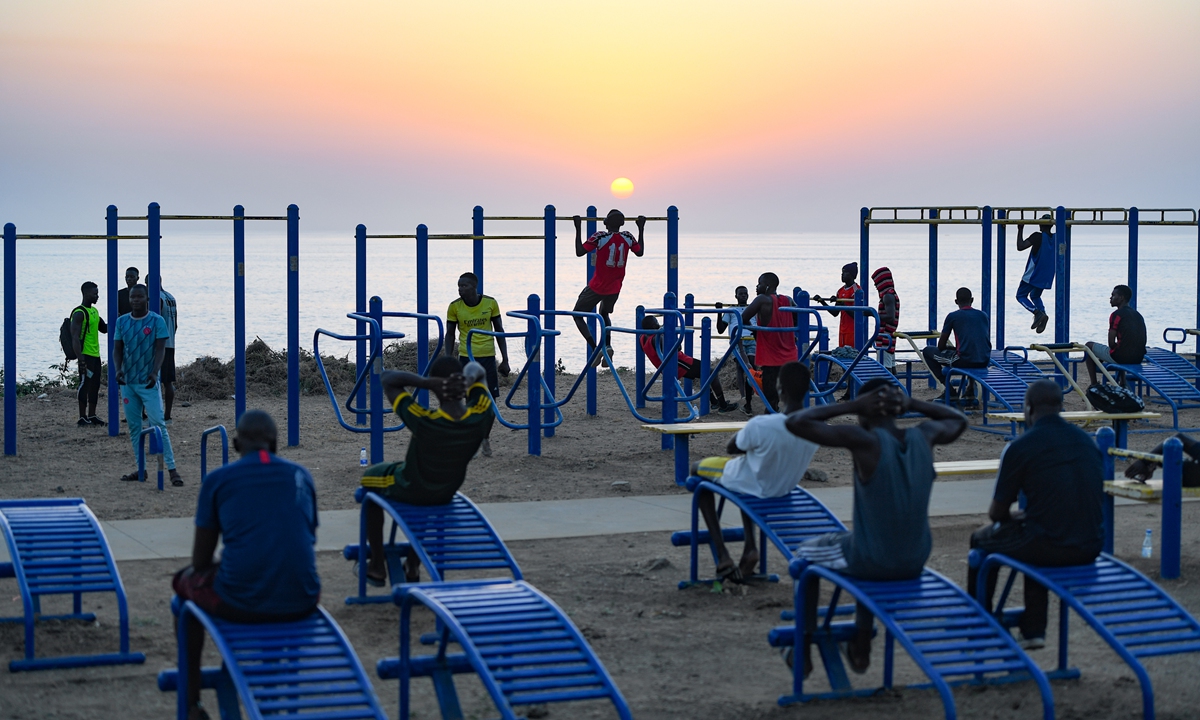
Since 2014, the private Chinese company StarTimes has been expanding its sports content in Africa, consistently investing in the acquisition of broadcasting rights for world-renowned sporting events.
They have built eight high-definition sports channels to broadcast various sports, including soccer, boxing, basketball, tennis, e-sports, and racing, to audiences in sub-Saharan Africa.
Just as Wang expressed, "I hope to use the company's platform to build more beneficial projects for the African people and contribute to China-Africa friendship in a modest way." This sentiment echo the feelings of many who are engaged in China-Africa exchanges.
Friendly exchanges between China and Africa have enjoyed a long history and have deepened in recent years, covering various fields such as politics, the economy, and culture. The Global Times is launching a China-Africa Rhapsody series, aiming to showcase the profound human connections and development visions between the two peoples by sharing the true stories of Chinese people in Africa and African people in China. From touching stories of China-Africa cooperation and exciting collisions of youthful ideas, to debunking fallacies concocted by some Western sources about the China-Africa collaboration, this series hopes to promote closer cooperation and deeper understanding between the peoples of China and Africa.
In this installment, we turn our attention to the world of sporting arenas. The Paris 2024 Olympics successfully concluded on Sunday night, local time, with athletes from China and Africa showcasing their remarkable talents. Sports cooperation between China and Africa began in the 1950s, and in recent years, significant achievements have been made in this field, making sports exchanges an important bridge for cultural exchange and mutual understanding between the Chinese and African peoples.
We spoke with coaches, experts, and enterprises directly involved in China-Africa sports exchanges to hear about their rich and diverse experiences and insights from working in Africa.

Achraf Hakimi of Morocco controls the ball during an African Cup of Nations game between Morocco and South Africa at Laurent Pokou Stadium in San Pedro, Cote d'Ivoire on January 30, 2024. Photo: VCG
Sports have become a new link in China-Africa cooperation, bringing joy and numerous benefits to numerous people.Sports exchanges between China and Africa began in the 1950s. In 1957, less than a year after China and Egypt established diplomatic relations, the Chinese table tennis team visited Egypt, marking the first Chinese sports delegation to set foot in Africa.
Since then, sports have played a vital role in bridging the two regions. The Chinese basketball and soccer teams have visited multiple African countries, while African teams like the Guinean and Moroccan national soccer teams have visited China.
These exchanges have deepened mutual understanding and trust, significantly contributing to the development of China-Africa relations.
In recent years, China has sent coaches for sports like badminton and table tennis to countries like Uruguay and has built or upgraded sports facilities in nations such as Guinea-Bissau. Additionally, China has provided technical training for large cultural and sporting events.
The 2021 White Paper "China and Africa in the New Era: A Partnership of Equals" released by the State Council highlighted that China has built 45 stadiums and 170 schools across Africa since 2000, training over 160,000 professionals, demonstrating the tangible benefits of the China-Africa partnership.
This growing "sports diplomacy" underscores the importance of cultural exchange and cooperation, enhancing the friendship between China and Africa.
The new home stadium
Wang Neng's initial impressions of Africa, aside from the scorching weather in West Africa, included the people's passion for soccer.
"Adults and children alike show off their soccer skills wherever they go," said Wang, 34, a project manager with the China Civil Engineering Construction Corporation (CCECC) based in Cote d'Ivoire.
Wang first arrived in Africa in 2015. He told the Global Times that most of the fields here were simply patches of wild grass, slightly modified for use as main venues for Cote d'Ivoire's soccer league. Ordinary people and children played casually on hard, unpaved fields.
Wang has made friends with locals by playing soccer, but he and his colleagues have done much more than that.
In January 2024, the 34th Africa Cup of Nations kicked off in Cote d'Ivoire, with the Laurent Pokou Stadium in San-Pedro, built by the CCECC, drawing significant attention.
The Laurent Pokou Stadium, with a seating capacity of over 20,000 and more than 2,000 parking spaces, saw local cultural elements incorporated into its construction. The venue boasts a world-class field, athletic track, and lighting. The CCECC also installed solar photovoltaic technology to support the country's sustainability efforts.
Now, with the CCECC having completed the construction of the main stadium and four training grounds in San Pedro, the local demand for sports facilities has been greatly met. The stadium's construction has also spurred the development of surrounding infrastructure, including hospitals, hotels, universities, airports, and municipal roads, significantly enhancing the city's image, the Global Times has learned from the CCECC.
Moreover, at least three stadiums built by Chinese companies were used in the Africa Cup of Nations held in Cote d'Ivoire earlier this year.
Despite some biased criticisms and attempts by Western media to sow discord in China-Africa relations, China's aid to Africa has consistently demonstrated a genuine understanding of the continent's needs and has withstood various tests.
Even The New York Times acknowledged in a February article that "no country has invested more effort in integrating into Africa's sports scene than China."
Perhaps they do not need not worry on behalf of Africans.
Team Cote d'Ivoire chose Laurent Pokou Stadium for their first two warm-up matches as the host country. Their star player, Sébastien Haller, praised the stadium, "For me, [it is] the best turf is at San-Pedro."
On February 13, 2024, Haller scored the winning goal in the final, helping Cote d'Ivoire defeat Nigeria to claim the championship of the 34th Africa Cup of Nations.
Coach for better
In the China-dominated table tennis field, there are also more African players who, with China's assistance and support, travel tens of thousands of miles to receive training in China along with their Chinese peers.
In late July, Nasri Malissa from Algeria made a speech at the 7th China-Africa People's Forum, sharing her story of receiving table tennis training in China. In 2016, Malissa attended the International Table Tennis Federation (ITTF) World Youth Championships held by the China Table Tennis College (CTTC) at the Shanghai University of Sport.
Malissa got the precious opportunity of being coached by renowned world champions including Zhang Yining during the championships. After that, Malissa said she made many excellent achievements in international competitions.
Malissa's experience has planted a seed in the hearts of more table tennis players in her home country, who dream of a similar journey to China. At an opening ceremony of the CTTC's summer school on July 1, 20-year-old Amdjed Oustani shared his excitement.
Oustani first heard of the CTTC from Malissa, who told him about the college's high-level coaches, first-class equipment, and an opportunity to meet the stars of the Chinese national table tennis team. "So, I was very happy and excited when I received the invitation from the CTTC," he said at the opening ceremony. "I'm super looking forward to learning more in the following month, and to become stronger in the world's number one table tennis country."

Algerian table tennis player Amdjed Oustani (second from right) poses for a group photo with world champion Zhang Yining (center) and other international table tennis players during the 7th China-Africa People's Forum in July, 2024. Photo: Courtesy of China Table Tennis College
The month-long summer school program in Shanghai was not easy for most international participants. Oustani, who finished the program and returned to Algeria last week, recalled that he had a few difficult times in the beginning, as he "was not used to training like this before."
"But the days became very good after that," Oustani told the Global Times. "I learned a lot in table tennis with this program, and also I learned from the serious discipline of the Chinese [table tennis teams], which is very important."
Oustani spent a wonderful month in Shanghai at the CTTC. He was coached by former members of the Chinese national team Feng Zhe and Zhang Qin. The latter used to coach Sun Yingsha, currently the world's top-ranked female table tennis player. Apart from training, Oustani visited tourist attractions across the city, from the most iconic The Bund and Yuyuan Garden, to the ITTF Museum and China Table Tennis Museum.
Oustani joked that he was born with a racket in his hands. His father was also a table tennis player, and he has been practicing the sport for 14 years. His favorite table tennis players are Ma Long, Wang Chuqin, and Xu Xin, all of whom are household names in China. "My goals in table tennis are to be an African champion and, why not [try to] beat some good and known players?" he told the Global Times.
Oustani participated in the CTTC's summer school program with the help of the college, the Chinese Embassy in Algeria, and the Algerian Chinese enterprises association.
Similar to what Malissa did at the China-Africa People's Forum, Oustani expressed his gratitude to China, which made this opportunity possible with joint efforts.
With the development of table tennis in Africa and the deepening of the China-Africa friendship, more African players are expected to receive training and learn advanced playing skills in China.
Sports for everyone
Of course, sports are not just for professional athletes - they're for everyone.
Today, in various locations across Africa, fitness parks built by Chinese companies have become popular destinations. These facilities, which are common in Chinese communities - simple yet durable and reusable fitness equipment - blend in seamlessly with the African landscape.
From 2016 to 2017, for example, under the organization of the Economic and Commercial Office of the Chinese Embassy in Senegal and the Association of Chinese Enterprises in Senegal, the China International Water and Electric Corporation (CWE) AIBD-Mbour-Thies Expressway in Senegal, in collaboration with over 20 Chinese companies, contributed to the construction of the Dakar Seaside Fitness Park and Kaolack Fitness Park.
These two fitness parks, spanning over 40,000 square meters, remain popular spots for daily exercise among local residents.
Since their completion, the Dakar Seaside Fitness Park and Kaolack Fitness Park have been widely appreciated and praised by the Senegalese government and citizens alike, greatly enriching the daily leisure activities of locals.
The Dakar Seaside Fitness Park, in particular, has become a beautiful evening attraction along the coast and is affectionately called the "China-Senegal Friendship Park" by locals, further strengthening the bond between the people of China and Senegal and establishing a positive corporate image.

People practice in a fitness park in Senegal Photo: Courtesy of CWE
In recent years, Chinese civil organizations have also actively engaged in sports exchanges under frameworks like the BRI, BRICS, and the Shanghai Cooperation Organization.Since 2014, the private Chinese company StarTimes has been expanding its sports content in Africa, consistently investing in the acquisition of broadcasting rights for world-renowned sporting events.
They have built eight high-definition sports channels to broadcast various sports, including soccer, boxing, basketball, tennis, e-sports, and racing, to audiences in sub-Saharan Africa.
Just as Wang expressed, "I hope to use the company's platform to build more beneficial projects for the African people and contribute to China-Africa friendship in a modest way." This sentiment echo the feelings of many who are engaged in China-Africa exchanges.


